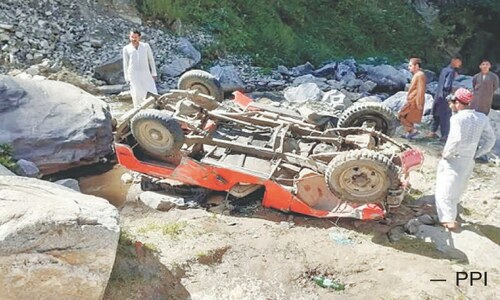PESHAWAR: The Peshawar High Court on Wednesday summoned the deputy commissioner of Kohat district seeking his response to a contempt petition over environmental pollution allegedly caused by a leading cement factory.
A bench consisting of Chief Justice Qaiser Rashid Khan and Justice Ijaz Anwar expressed displeasure over noncompliance with guidelines issued by the court in its judgement delivered five years ago, and directed the deputy director (legal) of the Khyber Pakhtunkhwa Environmental Protection Agency (EPA) to visit the factory and produce a report.
It fixed Friday (tomorrow) for next hearing into the petition filed by Zia Hafeez Afridi of Babri Banda area in Kohat, who sought contempt proceedings against the respondents, including the chief secretary, chief executive officer of the Kohat Cement Factory, EPA director-general, Kohat deputy commissioner, and some other officials.
The bench observed thatit took environmental matters seriously and the release of toxic chemicals was hazardous not only to human life but also to the flora and fauna of the region.
Resident calls for contempt action against officials, factory CEO
Barrister Asadul Mulk appeared for the petitioner and additional advocate general Syed Sikandar Hayat Shah represented the provincial government, whereas EPA deputy director (legal) Mumtaz Khan also turned up.
Mr Mumtaz said he visited the area and found certain claims by the petitioner to be against “ground realities.”
The bench directed him to go to the area again and produce a report on next hearing.
Barrister Mulk contended that the high court had issued a detailed judgement in 2017 over his client’s petition against environmental degradation caused by the Kohat cement factory in general and Babri Banda area in particular.
He pointed out that the court had recognised in that verdict the rights of petitioner and the residents of Babri Banda and directed the factory’s chief executive officer to run and operate its factory and commercial activities in accordance with safe standard operating procedures.
The lawyer said the EPA DG was also directed to ensure that a visit by monitoring inspectors to the factory site on a weekly basis and submit a report to him, while orders were also issued for the maintenance of a separate file of the cement factory and ensure that the factory didn’t violate standard operating procedures.
He contended that the court had directed the management of the factory to run their Electrostatic Precipitators Systems (EP System) at 15 points all times on all units which were under production.
Mr Mulk claimed that in spite the said clear and categorical directions of the court, the factory had resorted to both overt and covert means to circumvent the said directions and carry out its commercial activities and run its factory in pretty much the same way and manner as before, putting the lives and health of the residents of Babri Banda and adjoining areas at risk.
He said as the factory discharged “excessive levels” of fumes, dust and chemicals into the air, the nearby areas had a growing incidence of cancer, tuberculosis, asthma, bronchitis and other respiratory diseases.
The lawyer said the extensive blasting also caused structural damage to residential property in the area.
Published in Dawn, February 9th, 2023










































